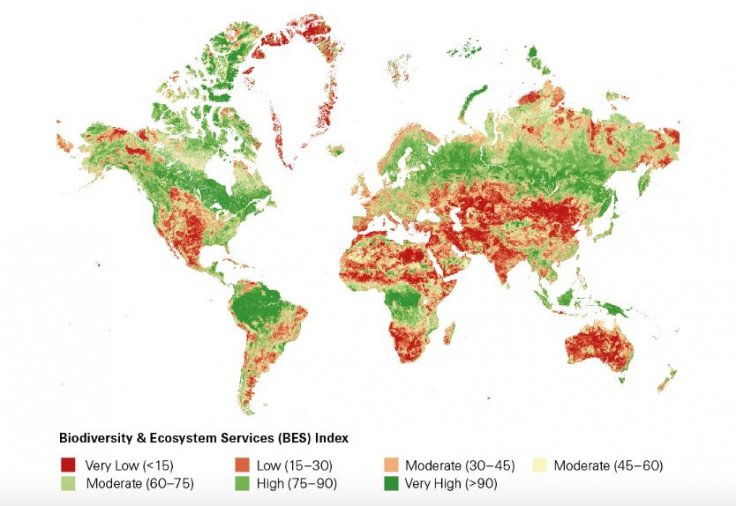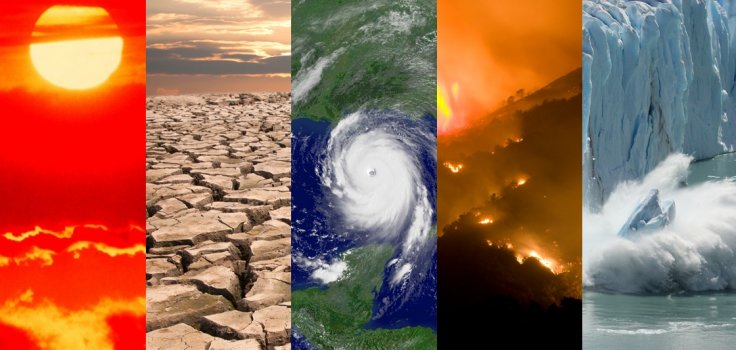The UN said in September that 10 years ago the world leaders committed to protecting the planet but it failed. Now, Swiss Reinsurance Company Ltd, commonly known as Swiss Re released an analysis report, which revealed that One-fifth of the world's countries are at risk of ecosystem collapse and the reason is none other than the destruction of wildlife and their habitats.
As per the recently published report, over half of global GDP that is $42 trillion depends on high-functioning biodiversity. But the risk of collapsing the ecosystem is growing.
Thanks to illegal and uncontrolled human activities, natural services such as clean water and air, food, and flood protection have already been damaged. Now the analysis—based on Swiss Re Institute's new Biodiversity and Ecosystem Services Index—has shown that both the developing and advanced countries are at risk of their ecosystems collapsing.

Countries at Risk
As per the Swiss Re's index of risk to biodiversity and ecosystem services, countries like Australia, Israel, and South Africa rank near the top of the list, India, Belgium, and Spain are also highlighted, while countries with fragile ecosystem as well as large farming areas, such as Nigeria and Pakistan are also flagged up.
The report noted that even though other nations like Brazil and Indonesia have large areas of intact ecosystems, they are massively dependent on natural resources. As per Swiss Re, this indicates the importance of protecting the forests, which plays a massive role to balance the environment.
The lead author of the study, Oliver Schelske said that "If the ecosystem service decline goes on [in countries at risk], you would see then scarcities unfolding even more strongly, up to tipping points."
The index was actually designed to help insurers assess ecosystem risks, but as per Swiss Re's chief research officer, Jeffrey Bohn it could help the world to see a bigger picture as the index allows businesses, as well as world governments, to "factor biodiversity and ecosystems into their economic decision-making".
As per the study, countries with over 30 percent of their area containing fragile ecosystems, were deemed to be at risk of ecosystem collapsing. Among the G20 countries South Africa, Australia, India, Turkey, Mexico, and Italy were seen as being most at risk, while the world's most powerful countries like China, the US, and the UK have taken seventh, ninth, and 16th position in the list.
The World Is Changing Rapidly

As per a recent report, the rising average temperature in the Himalayan region has forced many species like butterflies, moth, and other habitats to move higher up the mountains. The research also found that around 49 species of moth and 17 butterfly species have shown "considerable new upward altitude records."
In terms of Australia, several species, including reptiles, mammals, frogs, fishes, and birds are now believed to be in a very critical position. Environmental experts believe that this summer's bushfire and the ongoing habitat destruction on the east coast of Australia have aggravated the threat status of many species.
When it comes to Africa, especially the southern part of the continent, scientists revealed that a bacterial toxin is thriving more in the region due to warming temperatures in water bodies as a result of climate change and it has caused the mass death of the elephants in Botswana this year.
It is needless to say that the Arctic is also under massive threat. A team of scientists from 20 countries has witnessed the dramatic effects of global warming on ice in the Arctic region. Markus Rex, the leader of the world's biggest mission to the North Pole said, "We witnessed how the Arctic ocean is dying. We saw this process right outside our windows, or when we walked on the brittle ice."
The mission leader also noted that if the warming continues in the North Pole, then within a few decades the world will have "an ice-free Arctic in the summer."









